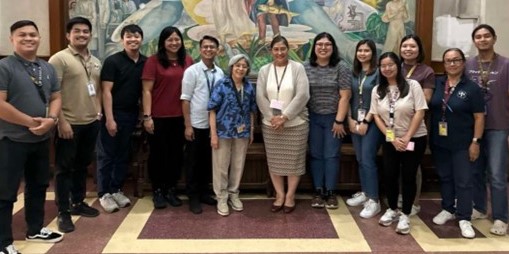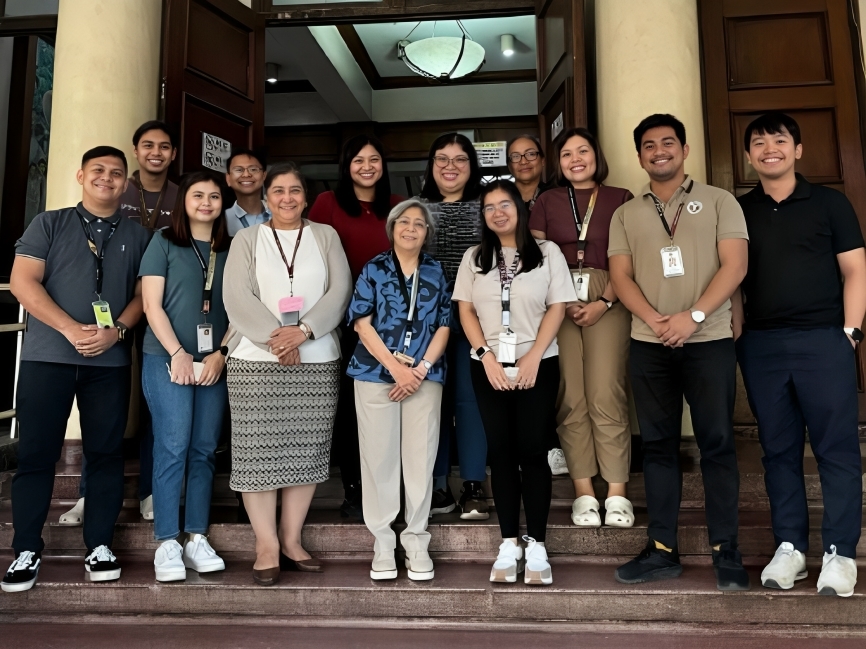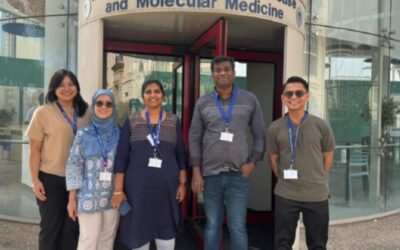Applying Science to TB Prevention and Care
RePORT Philippines
Origin Story
The Philippines remains to be among the top five high burden countries for TB with a continued increase in cases and deaths from 2015 to 2022. RePORT Philippines is a collaborative effort that was initiated by the Philippine Council for Health Research and Development (PCHRD) of the Department of Science and Technology (DOST) in August 2017 through a Memorandum of Understanding with the National Institute of Allergy and Infectious Diseases (NIAID) of the US National Institutes of Health (NIH). The aim of establishing the consortium was to serve as foundation for national and international collaborations to facilitate communication in the collection, dissemination, and sharing of information and knowledge on TB. RePORT Philippines has two sites – the University of the Philippines Manila–National Institutes of Health (UPM-NIH) and the De La Salle Medical and Health Sciences Institute (DLSMHSI).
Ongoing Priority Research
The DOST PCHRD has always included TB in its priority areas for research. This includes basic science and clinical research on epidemiology, social determinants, diagnostics development, therapeutics and vaccine development, as well as host and pathogenomics studies.
The UPM-NIH site, launched in 2018, focuses on recruiting persons with drug-susceptible TB and their household contacts, while the DLSMHSI site, launched in 2019, focuses on recruiting persons with drug-resistant TB and their household contacts. These two sites complement each other in terms of research focus and relevance, since the Philippines has high burden for both TB and drug-resistant TB (WHO, 2022).
UPM-NIH started study enrollment in June 2018 for the community-based cohort project “Long-term outcomes of diagnosed TB patients in the Philippines” which aimed to follow up the outcomes of patients for 2 years post-treatment and determine factors associated with unfavorable outcomes. UPM-NIH is also doing a sub-study within the RePORT cohort on “Dynamic detection of cytokines by liquid chip technology to evaluate the efficacy of anti-tuberculosis treatment” and RePORT Philippines and RePORT India collaborated on the proposal “Impact of latent TB infection and trained immunity on susceptibility to SARS-CoV-2 infection in India and the Philippines.”
The DLSMHSI COACH–DRTB Strategy, supports the RePORT International Consortium through a local groundbreaking project involving intensified case finding utilizing the Kagabay community workers to identify active DRTB cases and latent TB infection among DRTB contacts of bacteriologically confirmed cases with assessment factors for poor treatment outcome. The project also focused on the social value of the study with emphasis on the monitoring of adherence through community health workers using a patient-centered approach rather than traditional DOT.
2019
2024
Collaborations
RePORT Philippines has grown and expanded because of our collaborations with our partners in the RePORT International consortium. We have ongoing research projects with Rutgers New Jersey Medical School and RePORT India (e.g., LTBI-COVID study), Vanderbilt University (e.g., TB pathogenomics study), and Korea NIH (e.g., TB biomarker study). In addition, two junior researchers from RePORT Philippines were trained in RePORT South Africa, RePORT Brazil and Rutgers New Jersey Medical School, as part of the TB RICC Junior Investigators Laboratory Training Program. This has significantly capacitated our consortium to do more advanced TB biomarker research and data analysis.
Challenges
RePORT Philippines experienced several challenges in terms of research implementation and securing funding for the sustainability of the consortium. During the height of the COVID-19 pandemic, participant recruitment and follow up were very challenging because patients did not want to go to the rural health center to be tested for TB. Furthermore, many TB facilities were converted to COVID-19 testing facilities, thus scaling down the capacity for TB testing in the health centers. To address these challenges, the team implemented house-to-house visits to monitor and follow up our enrolled participants with the help of the community health workers.
Lack of funding for the continuation of RePORT Philippines is one of the most major challenges. Since the government funding for the RePORT Philippines sites ended in February 2023 and April 2024, respectively, patient recruitment could not continue to address new TB research gaps, such as subclinical TB. To address this, the research team crafted and submitted proposals for studies using the biobanked RePORT Philippines Phase I specimens. Thankfully, RePORT Philippines got several grants from DOST Philippines, Korea NIH and US-NIH which enabled it to maintain its biobanks and monitor enrolled participants.
Leadership
RePORT Philippines welcomes researchers from other institutions to collaborate in its journey to discover and validate biomarkers, and better understand subclinical TB, host susceptibility, and genomic factors in the progression of TB.
John Carlo Malabad, MD, PhD
Ruby Anne King, MD, PhD
Josephine Aldaba, MD
Carol Stephanie Tan-Lim, MD, MSc
Jonnel Poblete, MD, PhD
Dana Kamylle Santos RMT
Christine Mae dela Cruz RMT
Marck Anthony Sargento RMT
Guia Jobelle Orduna RMT
Kim Cochon, PhD, Noe Cenal
Allen Jerard Lunaria
Mina Capistrano
Rodel Morales
Brendalyn Red
Marilyn Epe
What's new
CRDF Global
CRDF GlobaLLongstanding Partners in International ResearchCRDF Global has been part of RePORT International’s research management processes for many years. This month, we wished to learn more about its history and the people who make it a successful and efficient. We...
Mutually Beneficial Collaboration
Mutually Beneficial CollabThe NIH, Infectious Diseases, and RePORT International: A Long-standing, Mutually Beneficial CollaborationThe National Institute of Allergy and Infectious Diseases (NIAID) under the US-based National Institutes of Health (NIH) had a long...
Hands-On Training
Hands-On TrainingHands-On Training Inspires Young RePORT Investigators to Become Future Leaders. A conversation with TB RICC Junior Lab TraineesThese trainees are our ambassadors, our advocates, and our futuresThe ability for hands-on lab training in the TB field is...






